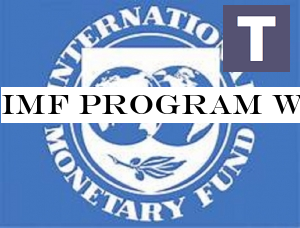
ECONOMYNEXT - The International Monetary Fund has resumed and extended a program with Sri Lanka giving 164.1 million US dollars to the central bank, which has to maintain a soft-peg with the US dollar to build more forex reserves.
IMF suspended its program with Sri Lanka after the central bank missed its forex reserve target, by printing money to push down rates through two liquidity shocks as the economy recovered in early 2018.The ensuing monetary instability has since undermined economic output."The Sri Lankan authorities have successfully brought the program back on track, despite important setbacks, by advancing fiscal consolidation through a well-targeted 2019 budget, rebuilding reserves, while maintaining a prudent monetary policy under greater exchange rate flexibility, and reviving structural reforms," IMF's Deputy Managing Director and Acting Chair of the Board Mitsuhiro Furusawa said in a statement."Sustaining policy discipline remains critical to strengthen resilience, given still sizable public debt and low external buffers, and support strong and inclusive growth." In 2018 the currency depreciation bloated national debt and put the brakes on revenues available to repay foreign debt by despite a nominal growth.
"The Central Bank of Sri Lanka should continue to pursue a prudent and data-dependent monetary policy," Furusawa said."The amendments to the central bank law will be a major step in the transition to flexible inflation targeting.
Efforts to build reserves should be sustained, under greater exchange rate flexibility, to protect the economy against shocks." Analysts have pointed out that Sri Lanka's balance of payments problems primarily come from the central bank printing money to keep rates down, while trying to target the exchange rate (deploying convertibility undertakings) which is the same reason that the Bretton Woods soft-peg system and European Exchange rate mechanism also collapsed.Sri Lanka is operating a de facto inflation targeting regime (cutting rates with printed money when inflation falls) which worsens policy contradictions in the soft-peg, leading to balance of pyaments poblems.
There are fears that a planned 'flexible inflation targeting' also involves a peg and a policy rate maintained by printed money given the frequent mentions of the need for 'reserve buffers'.The IMF has also given tools for Sri Lanka to calculate an output gap, implicitly giving the idea that policy rates can be cut when growth is lower than the number derived by econometrics, which is incompatible with maintaining a pegged exchange rate regime.In a peg rates can only fall if domestic credit growth slows.
The full statement is reproduced below:IMF Executive Board Completes the Fifth Review under Sri Lanka Extended Arrangement under the Extended Fund Facility; Grants Waivers of Nonobservance of Performance Criteria and Approves US$ 164.1 million disbursement and Extension of the Arrangement• Sri Lanka successfully brought the EFF-supported program back on track.
• Sustaining policy discipline remains critical to strengthen resilience and support strong and inclusive growth.
• Extension of EFF arrangement by one additional year will provide a policy anchor to complete Sri Lanka economic reform agenda.On May 13, 2019, the Executive Board of the International Monetary Fund (IMF) completed the Fifth Review of Sri Lanka economic performance under the program supported by an extended arrangement under the Extended Fund Facility (EFF).
[1] Completion of this review, upon the granting of waivers of nonobservance for the end December 2018 performance criteria on the primary balance and net official international reserves, makes available SDR 118.5 million (about US$ 164.1 million), bringing total disbursements under the arrangement to SDR 833.73 million (about US$ 1.155 billion).
The Executive Board also approved an extension of the arrangement by one additional year, until June 2, 2020, with rephasing of remaining disbursements.Sri Lanka three-year extended arrangement was approved on June 3, 2016, in the amount of about SDR 1.1 billion (US$1.5 billion, or 185 percent of quota in the IMF at the time of approval of the arrangement.
See Press Release No.
16/262 ).
Following the Executive Board discussion of the review, Mr.
Mitsuhiro Furusawa, Deputy Managing Director and Acting Chair of the Board, issued the following statement: &We join Executive Directors in extending our condolences to the government and people of Sri Lanka for the loss of life and suffering caused by the recent terror attacks.
&The Sri Lankan authorities have successfully brought the program back on track, despite important setbacks, by advancing fiscal consolidation through a well-targeted 2019 budget, rebuilding reserves, while maintaining a prudent monetary policy under greater exchange rate flexibility, and reviving structural reforms.
Sustaining policy discipline remains critical to strengthen resilience, given still sizable public debt and low external buffers, and support strong and inclusive growth.
&Sustained revenue mobilization is needed to place public debt on a downward path, while making space for critical public investment and an expansion of the social safety net under well-defined selection criteria.
Strengthening the selection and appraisal process of large-scale investment projects and assessing their fiscal affordability is critical, given Sri Lanka high public debt.
Stronger fiscal rules and a medium-term debt management strategy will support medium-term fiscal consolidation and debt reduction efforts.

 12
12






